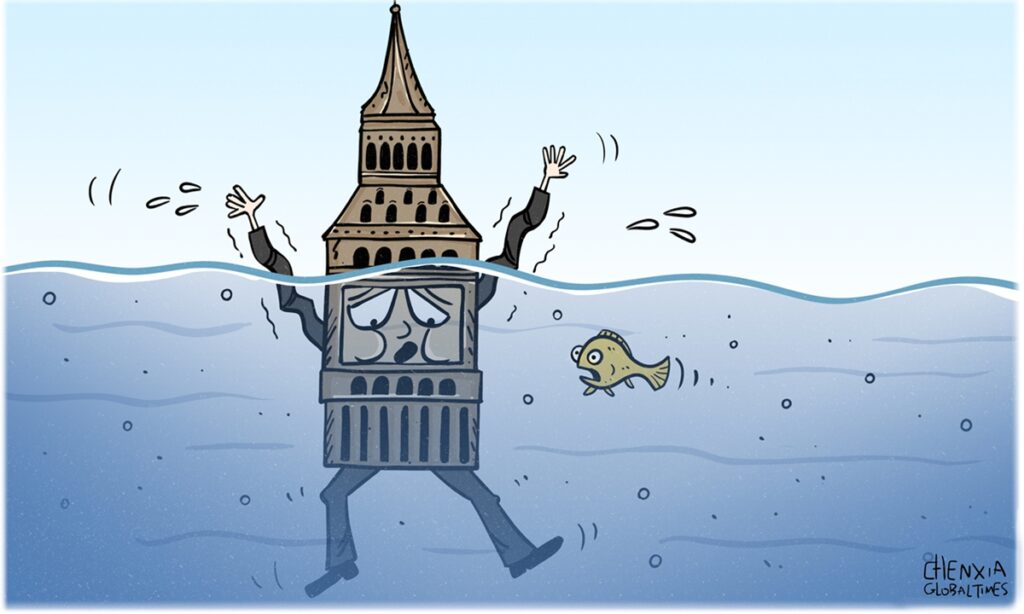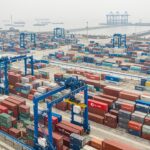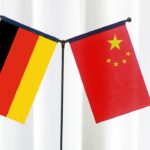Frequent changes of governments or prime ministers are futile in addressing Britain’s problems. And such practice will trigger even more problems.
After Liz Truss resigned as prime minister following only 45 days in office, who would become the next UK prime minister has once again become a hot spot issue. But it is not hot anymore. Rishi Sunak, former chancellor of the exchequer, on Monday was set to become Britain’s next prime minister after his last remaining contender dropped out of the race.
In a short span of less than two months, the British people would have lived through three prime ministers. What happened in UK’s recent political life adds much drama to UK political soap.
Given the frequent changes of prime ministers and cabinets, The Economist even used “Britaly” as a headline of its cover to portray today’s situation in the UK, which indicates a “country of political instability, low growth and subordination to markets.”
The political turmoil in the UK is an embodiment of the country’s confusion in the post-Brexit era. If the country cannot get out of the current bewilderment, the chaos won’t ease significantly. After the 2016 Brexit referendum, British politics has entered a period of relative mess, witnessing more political instability.
First, different views over Brexit have exacerbated divisions within the Conservative Party as well as in the UK society. Even though the UK has already completed the separation from the EU, those supporting staying in the EU and those backing to leave represent very different ideas and positions on fields, including the direction of the UK’s development. This split will be long-standing and difficult to reconcile.
Second, the Conservative Party also splits on many detailed policies, which can be exemplified by the contest between Sunak and Truss, especially in the economy. The Conservative Party cannot keep on the same page on how to deal with challenges at home as well.
Furthermore, as Cui Hongjian, director of the Department of European Studies at the China Institute of International Studies, told the Global Times, the UK’s current political turmoil also has something to do with its political system. This is because, under this political system, a rivalry is encouraged both within the Conservative Party and in the parliament. When the political competition and struggle intensify, the rules and legal intervention is relatively lagging behind, which will exacerbate its political turmoil.
The UK’s recent political turmoil reflects the endogenous structural contradictions of capitalism, Shen Yi, a professor at the School of International Relations and Public Affairs of Fudan University, told the Global Times. For a long period after the Cold War, the propaganda of capitalism from Western countries such as the US and the UK was successful, which effectively whitewashed such contradictions, while at present, with the decline of Washington and London, such contradictions cannot be successfully concealed.
If these countries, such as the UK, intend to fundamentally tackle the turmoil, they need to adjust their political systems. But in fact, when confronting difficulties, these countries work under the premise that capitalism is correct and it cannot be fundamentally adjusted, noted Shen. In this context, they cannot achieve their goals regardless of how much they try.
Cui said that to maintain its ruling position, the Conservative Party now attempts to change government through its leadership reshuffle, instead of a general election, at a time of policy mistakes. This involves a problem of legitimacy on whether the government represents the interests of the Conservative Party or the interests of the country.
Given the UK’s national strength and global influence after having withdrawn from the EU, it will be increasingly difficult to achieve the goals set before Brexit. Against this backdrop, London’s confusion will continue, and its political instability is anticipated not to be effectively resolved.
(Global Times)




